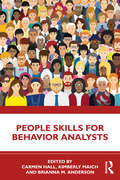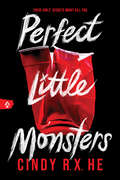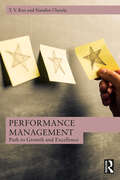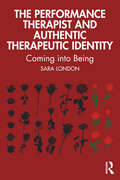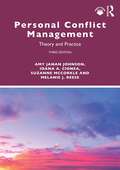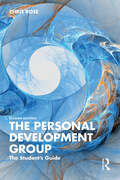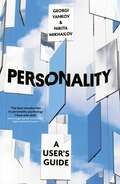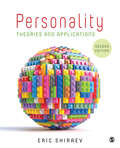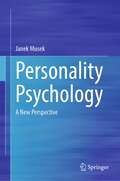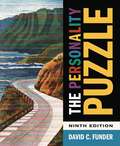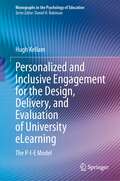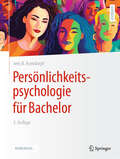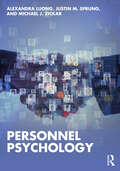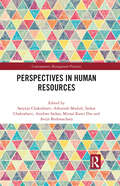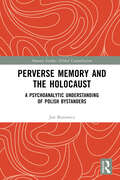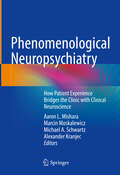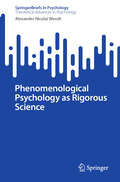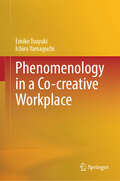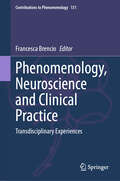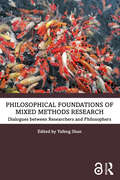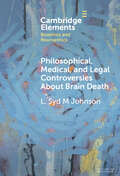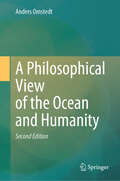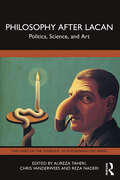- Table View
- List View
People Skills for Behavior Analysts
by Carmen Hall Kimberly Maich Brianna M. AndersonPeople Skills for Behavior Analysts provides a much-needed introduction to the people skills needed to succeed as a behavior analyst. Divided into two primary parts – Foundational Skills and Specialized Skills – this book addresses an impressive breadth of people skills, focusing on intrapersonal and interpersonal skills, collaboration, consultation and training, leadership, and resource development. Relying on recent evidence-based practices and relevant literature tailored to meet the new BACB Task List, Professional & Ethical Compliance Code, and Supervised Independent Fieldwork requirements, the text includes contributions from leading figures from a wide variety of applied behavior analysis subfields to provide a truly balanced overview. The book delves into the literature from fields related to behavior analysis, such as counselling, psychology, graphic design, management and education, and applies these perspectives to behavioral theories and principles to provide students, new graduates, and seasoned professionals with research, best practices, reflective questions, and practical techniques. From reflecting on one’s practice, to learning essential therapeutic skills, running a great meeting, becoming a ‘super’ supervisor, and delivering a memorable presentation, all people skills are included in one place for the behavior practitioner. This is a valuable resource for undergraduate and graduate students studying Applied Behavior Analysis (ABA), and will also appeal to recent graduates and behavior analysts looking to improve their existing skillset.
Perfect Little Monsters
by Cindy R. HeSomeone has murdered the queen bee of Sierton High School. All the dead girl's friends are suspects. And each one has a reason for wanting her to die.Ella Moore was the most popular girl in school…and also the most hated. When she's murdered at her own party, there are too many suspects to count. And too many people who think she deserved it.The police's prime suspect is the new girl, Dawn Foster. Dawn was the last to hand Ella a drink on the night she died. Plus, all of Ella's friends with a motive for wanting Ella dead are more than willing to throw Dawn under the bus, if it means keeping the heat off themselves. But Dawn refuses to go down without a fight. She's determined to clear her name. As she delves deeper into the past, she discovers that Ella and her friends had major enemies, and someone is out for revenge. Dawn must uncover the truth before the police arrest the wrong suspect… and before the next person dies.
Performance Management: Path to Growth and Excellence
by T. V. Rao Nandini ChawlaThis book attempts to shift focus from performance appraisals to performance management incorporating performance planning, analysis, and development as critical components of it. The performance management system (PMS) is a future-driven exercise rather than merely a past-reviewing exercise. Performance management is treated as a year-round practice and not an appraisal process conducted once a quarter or annually. Moreover, it is now considered to be everyone’s responsibility and not merely that of HR or the upper management.This book advocates the structuring of PMSs and their implementation. It incorporates the most modern 360-degree feedback systems and shows the ways and means of integrating it into PMS. Arguments are offered to use rating-less appraisals and/or a combination of appraisals with 360-degree feedback. It defines performance management to mean continuous improvements in performance of individuals, their teams, departments, and corporations. It also outlines that planning, analysis, review, coaching, and capability building are essential building blocks for good performance management.Concise, lucid, and engaging, this volume would be useful to the students, researchers, and faculty of human resource management, organizational behaviour and applied psychology. It would also be an invaluable guidebook for practicing business executives and HR professionals to help them implement the performance management system for effective talent management leading to increased productivity.
The Performance Therapist and Authentic Therapeutic Identity: Coming into Being
by Sara LondonExploring what it means to be an authentic therapist in the present day, Sara London playfully melds together the tenets of performance art and psychoanalytic theory to advance the hopeful new notion of the performance therapist. In an era where the therapist is now more of a public-facing entity than ever before, developing a sense of who one is both inside and outside of the consulting room is a complex undertaking. In response, London reconceptualises the therapist’s identity in a contemporary way, transcending preconceived labels, by bringing an understanding of performance art into an analysis of psychotherapeutic practice. Through this interdisciplinary approach, London attends to the complex questions faced by psychoanalysts and psychotherapists in training and in practice: can a therapist perform and be authentic? Can a therapist perform and have true intimate relationships within the confines of that performance? And can a therapist perform as themselves? This provocative and highly original work will provide both new and experienced psychotherapists with an understanding of the clinical and philosophical significance of performance art to cultivating therapeutic identity.
Personal Conflict Management: Theory and Practice
by Melanie J. Reese Suzanne McCorkle Amy Janan Johnson Ioana A. CioneaThis third edition bridges the theory behind why conflict occurs with specific skills and tools to transform difficult interpersonal encounters into beneficial, constructive exchanges.Providing an understanding of the common causes of conflict, this edition continues its discussions of causes of conflict, what affects how conflict occurs and unfolds, and strategies to manage conflict. Separate chapters are dedicated to examining conflict in common, everyday contexts such as families, friendships, the workplace, or on social media. This edition also features updated information and examples, further connections between conflict and communication, a revised chapter on conflict in close relationships, as well as a new chapter on intercultural conflict.The book is ideal for introductory conflict and communication courses at the undergraduate or graduate level.An instructor manual, significantly updated as well, is also available online, including summaries of the chapters, activities, a test bank, and sample syllabi and assignments. Please visit www.routledge.com/ 9781032412412
The Personal Development Group: The Student's Guide
by Chris RoseThe Personal Development Group plays a key part in counselling and psychotherapy training, and this book offers an insight into how it works and how to make best use of it. Taking the perspective of the student, it charts the course of the group through various stages, dealing with fundamental themes such as conflict, authority, difference and defences. The Personal Development Group has a dual focus upon individual experience and group process that provides the student with a valuable resource in understanding and making better use of their own PD group. This fully updated new edition contains discussion of socio-political, economic and cultural considerations, including diversity and equality, and looks at the challenges of the online group and social media. It includes examples and exercises throughout to enhance learning. The Personal Development Group will encourage students of counselling and psychotherapy to engage with their own development in a proactive and informed manner and invite them to challenge attitudes and assumptions in a thoughtful self-reflexive style. It will be essential reading for students of any course with a PD group, irrespective of theoretical model.
Personality: A User's Guide
by Nikita Mikhailov Georgi Yankov'The best introduction to personality psychology I have ever read' Robert Hogan, founder and president, Hogan Assessment SystemsWe are each born with a particular genetic makeup and traits that are further shaped by our individual environments and life experiences, creating a personality unique to us. But at no point are we given a manual for how to use that personality in our relationships or at work, for how to make sense of the facets that create our sense of self, or for how to troubleshoot our personality if there are things we are unhappy with.Personality: A User's Guide is that missing manual. An authoritative and comprehensive guide to personality psychology, this book outlines the different building blocks of our personality, presents the many theories and models that have been argued over the years, and helps you identify where you stand on the spectrum of key traits that define us.Using this knowledge about yourself, the book also suggests ways you can better empathise with those around you who may have very different approaches to the world, and how we can all leverage our different strengths. The authors also consider the constantly developing nature of the self, and ways we can turn that to our advantage and make changes for greater success and wellbeing.Finally, the book looks at some specific questions: Can our pets be said to have their own personalities? What happens when the 'dark triad' of negative traits are dominant? And is there a future in store where we can say that an AI has a genuine personality?
Personality: A User's Guide
by Nikita Mikhailov Georgi Yankov'The best introduction to personality psychology I have ever read' Robert Hogan, founder and president, Hogan Assessment SystemsWe are each born with a particular genetic makeup and traits that are further shaped by our individual environments and life experiences, creating a personality unique to us. But at no point are we given a manual for how to use that personality in our relationships or at work, for how to make sense of the facets that create our sense of self, or for how to troubleshoot our personality if there are things we are unhappy with.Personality: A User's Guide is that missing manual. An authoritative and comprehensive guide to personality psychology, this book outlines the different building blocks of our personality, presents the many theories and models that have been argued over the years, and helps you identify where you stand on the spectrum of key traits that define us.Using this knowledge about yourself, the book also suggests ways you can better empathise with those around you who may have very different approaches to the world, and how we can all leverage our different strengths. The authors also consider the constantly developing nature of the self, and ways we can turn that to our advantage and make changes for greater success and wellbeing.Finally, the book looks at some specific questions: Can our pets be said to have their own personalities? What happens when the 'dark triad' of negative traits are dominant? And is there a future in store where we can say that an AI has a genuine personality?
Personality: Theories and Applications
by Eric ShiraevPersonality: Theories and Applications takes an interdisciplinary and cross-cultural approach to the study of personality. Author Eric Shiraev structures the text around three questions: What are the basic ideas and facts that we focus on? How do we study these ideas and facts? How do we apply them? Students will benefit from a deeper understanding of personality as they navigate a wide range of theories, empirical studies, and thought-provoking exercises, fostering enhanced critical thinking and knowledge. The Second Edition includes a new chapter on the digital domain of personality, incorporates the latest findings from the fields of behavioral economics and neuroscience, and offers expanded coverage of LGBTQ+ issues, including prejudice and cultural stereotypes. Included with this title: LMS Cartridge: Import this title’s instructor resources into your school’s learning management system (LMS) and save time. Don’t use an LMS? You can still access all of the same online resources for this title via the password-protected Instructor Resource Site.
Personality: Theories and Applications
by Eric ShiraevPersonality: Theories and Applications takes an interdisciplinary and cross-cultural approach to the study of personality. Author Eric Shiraev structures the text around three questions: What are the basic ideas and facts that we focus on? How do we study these ideas and facts? How do we apply them? Students will benefit from a deeper understanding of personality as they navigate a wide range of theories, empirical studies, and thought-provoking exercises, fostering enhanced critical thinking and knowledge. The Second Edition includes a new chapter on the digital domain of personality, incorporates the latest findings from the fields of behavioral economics and neuroscience, and offers expanded coverage of LGBTQ+ issues, including prejudice and cultural stereotypes. Included with this title: LMS Cartridge: Import this title’s instructor resources into your school’s learning management system (LMS) and save time. Don’t use an LMS? You can still access all of the same online resources for this title via the password-protected Instructor Resource Site.
Personality Psychology: A New Perspective
by Janek MusekThis book integratively examines theories and models of the most essential findings of personality psychology with the aim of advancing personality knowledge. Since much empirical research is applied to very specific problems, the larger picture can get lost. Rather, this book starts from a coherent scientific theoretical framework, rather than presenting diverse theories of personality — phenomenological empirical, psychoanalytic behavioral, humanistic and cognitive perspectives — without enough critical examination. In this book, all theories, models and perspectives are reviewed and discussed within a unified theoretical framework of psychology Thus, historically and conceptually different models can be considered by scientific standards. Its insights will be highly relevant to academics, students and professional alike.
The Personality Puzzle (Ninth Edition)
by David C. FunderThe ultimate reading and active learning experience for personality science. The Personality Puzzle is heralded as the book that helps students think critically about the science of personality and find joy in the journey through David Funder’s unparalleled writing. New for the Ninth Edition, The Personality Puzzle introduces the latest scientific research and relevant social media applications, with a focus on the exciting work of underrepresented psychologists today. Student learning moves online with a new, assignable, interactive ebook that engages students with active learning opportunities. Students will be able to analyze their own personalities through online Try for Yourself surveys and assess their reading through Check Your Understanding questions that provide retrieval practice in every section. InQuizitive adaptive assessment rounds out the lesson, using research-proven techniques to help students “lock in” what they learn.
Personalized and Inclusive Engagement for the Design, Delivery, and Evaluation of University eLearning: The P-I-E Model (Monographs in the Psychology of Education)
by Hugh KellamThe book examines the intersections of online learning theories and models in the current research literature for teaching in digital environments in postsecondary education. It describes the connection between eLearning theory and practice to develop a pragmatic and adaptable model for the design, development, and implementation of interactive, personalized, and inclusive online learning experiences. The book discusses a model with three themes – personalization, inclusiveness, engagement (the P-I-E model) – that describe facilitation techniques, instructional design methods and evaluation tools to customize eLearning for higher education students. It offers theoretical underpinnings, implementation tips, a design checklist and evaluation questions for each of the model’s sections. In addition, the book presents an implementation plan for the elements of the model based on principles of change management and program planning. The volume can be used as either a comprehensive system to design an entire online course or as a reference guide to improve selected components of an existing program.Key areas of coverage include:Review of eLearning theories.Examination of the characteristics of individual learners, professors, and class communities in online environments.Recommendations for instructional design, assessment, and evaluation for online students.Best practices for learner engagement including scheduling, communication, and user interface design.Program implementation strategies and evaluation questions for all sections of the P-I-E model.Personalized and Inclusive Engagement for the Design, Delivery, and Evaluation of University eLearning is an essential resource for instructional designers, college instructors, and university professors to create, implement, evaluate, and improve personalized and inclusive learning for postsecondary students.
Persönlichkeitspsychologie für Bachelor
by Jens B. AsendorpfDieses Lehrbuch erklärt alle wichtigen Themen des psychologischen Grundlagenfachs „Persönlichkeitspsychologie“ kompakt und verständlich. Zahlreiche Fallbeispiele und Praxishinweise stellen dabei den Bezug zum Alltag her, Lernziele, Kontrollfragen und weiterführende Literatur helfen bei der gezielten Prüfungsvorbereitung. Doch das Buch bietet noch viel mehr: Die begleitende Website lehrbuch-psychologie.springer.com enthält kostenlose Lerntools für Studierende sowie Lehrmaterialien für Dozierende zum Download.
Personnel Psychology
by Alexandra Luong Justin M. Sprung Michael J. ZickarAccessible and engaging, this textbook introduces students to the field of personnel psychology, also known as industrial psychology. Based on their years of teaching in this area, Luong, Sprung, and Zickar survey core topics in the field, including job analysis, recruitment, selection, assessment, and performance evaluation. Throughout, they emphasize a psychological – rather than management – approach, explaining the key psychological principles that underpin human resources practices. Supported by plentiful examples, review questions, and discussion questions, this comprehensive overview shows how personnel psychologists endeavor toward a better workplace. Written in a clear and captivating style, this book introduces students to the most recent and pertinent scientific research in personnel psychology, and inspires future study in industrial-organizational psychology and related fields.
Perspectives in Human Resources (Contemporary Management Practices)
by Satyajit Chakrabarti Ashutosh Muduli Saikat Chakrabarti Anirban Sarkar Mrinal Kanti Das Avijit BrahmacharyThis book takes a practical approach to human resource management (HRM), providing practising managers, researchers, and students with a framework for developing and implementing human-centred HR strategies.Enabling human-centred HRM approaches allows businesses and industries to implement suitable processes and systems which keep their employees’ wellbeing in mind and build sustainable workforces, and organisations. The book focuses on the use of numerous tools in HR analytics and their application across disciplines and industries. Using empirical data, review of existing research, and case studies, the chapters in the volume look at the organisational processes and performance of various HRM strategies and explore themes such as diversity and inclusiveness in the workplace, organisational culture, inclusive leadership, non-verbal communication, cross-cultural management, work-life balance, and the focus on the physical and emotional wellbeing of employees.Part of Contemporary Management Practices series, this book will be useful to practising managers, researchers, and students of human resource management, organizational studies, business studies, psychology, and behavioural sciences.
Perverse Memory and the Holocaust: A Psychoanalytic Understanding of Polish Bystanders (Memory Studies: Global Constellations)
by Jan BorowiczPerverse Memory and the Holocaust presents a new theoretical approach to the study of Polish memory bystanders of the Holocaust. Drawing on psychoanalytic theory, it examines representations of the Holocaust in order to explore the perverse mechanisms of memory at work, in which surface a series of phenomena difficult to remember: the pleasure derived from witnessing scenes of violence, identification with the German perpetrators of violence, the powerful fear of revenge at the hands of Jewish victims, and the adoption of the position of genocide victims. Moving away from the focus of previous psychoanalytic studies of memory on questions of mourning, melancholy, repressed memory, and loss, this volume considers the transformation of the collective identity of those who remained in the space of past Holocaust events: bystanders, who partook in the events and benefited from the extermination of the Jews. A critique of ‘perverse memory’ that hampers attempts to work through what is remembered, this book will be of interest to scholars across the social sciences working in the fields of Holocaust studies, memory studies, psychoanalytic studies, and cultural studies.
Phenomenological Neuropsychiatry: How Patient Experience Bridges the Clinic with Clinical Neuroscience
by Marcin Moskalewicz Michael A. Schwartz Aaron L. Mishara Alexander KranjecThis innovative book offers a multidimensional exploration of the epistemological foundations of psychiatry and its major disorders. By emphasizing the importance of phenomenology in unravelling the intricate interplay between basic categories of human experience and neurobiological processes, it advocates for a shift in both psychiatric research and clinical practice. Phenomenological Neuropsychiatry presents psychiatry as a hybrid discipline that synthesizes subjective mental experiences with objective neuroscientific findings and forms an integrative and interdisciplinary structure that provides a dialectical bridge between understanding, compassion, and explanation. The first section of the book presents the lived experience of psychosis and argues for a more inclusive approach to mental health issues. The second section examines the ways in which psychiatric knowledge is constructed and the unique challenges posed by combining understanding and explanation of mental disorders. Section three sheds light on how disruptions in bodily experiences, memory processes, and self-perception can contribute to the development and manifestation of psychiatric issues. The following section discusses disorders of mood and anxiety, including the phenomena of depression, obsessions, and depersonalization. The fifth and final section provides an in-depth examination of psychotic disorders. It covers a range of topics, such as timing, intentionality, self-monitoring of action in schizophrenia, and the neurobiology of prodromal psychosis. As a singular work dedicated to revitalizing and advancing cross-fertilization between psychiatry and phenomenology, this groundbreaking book clears the foggy operationalized clusters of mental symptoms that may obscure diagnosis and treatment and argues for systematic integration of patient subjectivity and collaboration in clinical research. It features an authorship of the leading clinicians and thinkers from throughout the world in psychiatry, psychology, neuroscience, social sciences, and philosophy. Phenomenological Neuropsychiatry: How Patient Experience Bridges the Clinic with Clinical Neuroscience is a major contribution to the clinical literature and a must-read for psychiatrists, neurologists, psychologists, and professionals and students from other disciplines concerned with absorbing a deeper understanding of psychiatric disorders.
Phenomenological Psychology as Rigorous Science (SpringerBriefs in Psychology)
by Alexander Nicolai WendtExperimental psychology depends on theoretical and methodological foundations. Addressing these foundations is not always trivial and requires a shift in epistemological perspective. Phenomenology can provide a framework that helps to discuss the possibilities and challenges of the discipline. This book provides a historical overview of the phenomenological movement as well as a systematic introduction to the research approaches that are known as ‘phenomenological psychology’. The central claim is that the phenomenological discourse can increase the conceptual, descriptive, and methodological rigor in psychology. The purpose of the book is to facilitate the dialogue between phenomenology and cognitive sciences. It is meant to be a guide for interested scholars but also offers new ideas for experts in the field.
Phenomenology in a Co-creative Workplace
by Ichiro Yamaguchi Emiko TsuyukiThis book introduces phenomenology to reveal how the atmosphere and relationships in the workplace are generated and how this affects creativity. In their daily work, people sometimes feel that "today's meeting was more exciting than expected" or that "everyone's motivation is down”. This unspoken workplace atmosphere has a significant impact on their work. But has enough thought been given to how this workplace atmosphere is created? Phenomenology reveals the basic structure of human relationships in the workplace. Are there any general rules that govern human interaction and the nature of relationships in that workplace? If these unspoken rules can be made explicit – clearly felt and spoken — people can work together to bring about a creative workplace in which individuals can maximize their abilities. The main point of the book is that human relationships are based on a two-layered structure: "emotional communication", which is rooted in human sensitivity and centers on sensation and emotion; and "verbal communication", which is based on shared intelligence and relies upon language and thought. The invisible layer of emotional communication is always at work as the foundation of verbal communication, creating what can be described as the "workplace atmosphere”. This book offers a new perspective on promoting creativity in the workplace by unraveling the principles behind the structure of workplace atmospheres.
Phenomenology, Neuroscience and Clinical Practice: Transdisciplinary Experiences (Contributions to Phenomenology #131)
by Francesca BrencioThis book offers fundamental insights into three main fields of education and expertise: phenomenology, neuroscience, and clinical practice. The richness and pluralism of the contributions aim to overcome the reductionist and dualistic approach to mental health and shed new light on clinical practice. Designed as both an education tool for mental health professionals, and a theoretical investigation for philosophers on the use of phenomenology in clinical practice, this book highlights the need for a new direction on mental health, and more general, on human wellbeing. This volume aims to fill the gap between philosophers and mental health professionals on an educational level, in a space unique in its open and transdisciplinary approach. It appeals to students and researchers but also very much to professionals and clinicians in the field.
Philosophical Foundations of Mixed Methods Research: Dialogues between Researchers and Philosophers
by Yafeng ShanPhilosophical Foundations of Mixed Methods Research provides a comprehensive examination of the philosophical foundations of mixed methods research. It offers new defences of the seven main approaches to mixed methods (the pragmatist approach, the transformative approach, the indigenous approach, the dialectical approach, the dialectical pluralist approach, the performative approach, and the realist approach) written by leading mixed methods researchers. Each approach is accompanied by critical reflections chapter from philosophers’ point of view. The book shows the value of the use of mixed methods from a philosophical point of view and offers a systematic and critical examination of these positions and approaches from a philosophical point of view. The volume also offers a platform to promote a dialogue between mixed methods researchers and philosophers of science and provides foundations for further research and teaching of this hotly debated topic. This volume is ideal for researchers and advanced students, and anyone who is interested in research methods and the social sciences more generally.
Philosophical, Medical, and Legal Controversies About Brain Death (Elements in Bioethics and Neuroethics)
by null L. Syd JohnsonThis Element considers current legal, ethical, metaphysical, and medical controversies concerning brain death. It examines the implicit metaphysical and moral commitments and dualism implied by neurological criteria for death. When these commitments and worldview are not shared by patients and surrogates, they give rise to distrust in healthcare providers and systems, and to injustice, particularly when medicolegal definitions of death are coercively imposed on those who reject them. Ethical obligations to respect persons and patient autonomy, promote patient-centered care, foster and maintain trust, and respond to the demands of justice provide compelling ethical reasons for recognizing reasonable objections. Each section illustrates how seemingly academic debates about brain death have real, on-the-ground implications for patients and their families.
A Philosophical View of the Ocean and Humanity: Second Edition
by Anders OmstedtThis book provides an overview of major threats to our blue planet. But also tools for connecting facts and values to change our often destructive behavior towards nature. The solutions to achieving an ocean in harmony with man are within us, where compassion, curiosity, empathy, courage, and creativity are needed for sustainable change. Therefore, with this book, I want to arouse your curiosity and give the reader, the courage to face the future better by introducing tools for deep diving into our outer and inner world with many hidden resources. The book brings the reader into humans' challenges with the ocean and its future. It addresses some of the main questions in the United Nations Ocean Decade initiative that aims to change how humans deal with the ocean. This unique book will stimulate a broad way of thinking by connecting analytical science thinking and intuition. In the book's first part, art and dreams are used to connect science and art. This knowledge is then applied in part II of the book, written in two modes: a concerned science mode and an intuitive, artistic mode in which the ocean is given a voice. Part III illustrates how science and art can be connected to increase our awareness of the state of the ocean and support behavioral change.
Philosophy After Lacan: Politics, Science, and Art (The Lines of the Symbolic in Psychoanalysis Series)
by Alireza Taheri Chris Vanderwees Reza NaderiPhilosophy After Lacan: Politics, Science, and Art brings together reflections on contemporary philosophy inspired by and in dialogue with Lacanian theory.Rather than focus on the thinkers who came before Lacan, the editors maintain attention on innovations in contemporary philosophy that owe their emergence to complimentary, critical, direct, or tangential engagement with Lacan. This collection makes one of the first concerted efforts to expand discussions between psychoanalysis and more recent philosophical thinkers while gathering chapters by some of the leading philosophical voices of the present moment. With contributors from around the world, this book has international appeal and is unique in its emphasis on contemporary philosophies inspired or influenced by Lacan.Philosophy After Lacan will not only appeal to psychotherapists and psychoanalysts, but also to students and professors of philosophy, critical theory, psychology, politics, history, and literature.
